- Countertop Supplies Home
- Concrete Countertop Molds
- Concrete Countertop Mix
- Pigments & Custom Options: Color additives, special effects & decorative add-ins
- Countertop Reinforcement
- Casting Equipment: Tables, mixers, vibrators & curing covers
- Countertop Finishing & Installation
- How to Polish Concrete Countertops
- Sealers for Concrete Countertops
- Delivery and Installation
- Related Reading
- Problems with Concrete Countertops
- Countertop Product Reviews
- Concrete Countertop Basics: Pricing, colors, edge details, and more
Guide to Concrete Countertop Reinforcement
Do concrete countertops need reinforcement?Concrete countertops are not supported by a subgrade, as are floors and other slabs. They are like cantilevers and must be reinforced to limit structural cracking and ensure sufficient tensile strength and ductility. There are number of different reinforcing materials you can use to get the job done. Some contractors combine various methods, such as wire mesh and fiber reinforcement, to help reduce the chances of both structural and hairline cracking.
Shop for concrete countertop mixes and supplies
Steel rebar and wire mesh
Many countertop fabricators rely on traditional steel rebar (no larger than 3/16 inch in diameter) or galvanized wire mesh to reinforce concrete countertops. Another option is galvanized masonry wire that’s about 3/16 inch in diameter and welded together like a ladder. This wire has a tensile strength, making it ideal for reinforcing countertops.
To be effective, steel reinforcing materials should be placed in the bottom half of the countertop slab. Sufficient concrete cover is required to prevent corrosion and rust stains.
Pro tip: Don't use rebar to reinforce countertops that are less than two inches thick. The rebar is too big and may even cause cracking rather than prevent it. However, rebar can be used in thicker countertops or to support daring overhangs.
Carbon-fiber grid
A corrosion-resistant, lighter-weight alternative to steel or wire mesh is a carbon-based reinforcing grid. The grid is a flexible mesh of flat carbon fibers woven into a 1 1/2-inch grid and bonded together with epoxy. It’s available in roll form for ease of use and said to provide greater tensile strength than steel by weight. Unlike steel reinforcing, the carbon grid can be installed just below the finished surface, since there is no risk of corrosion.
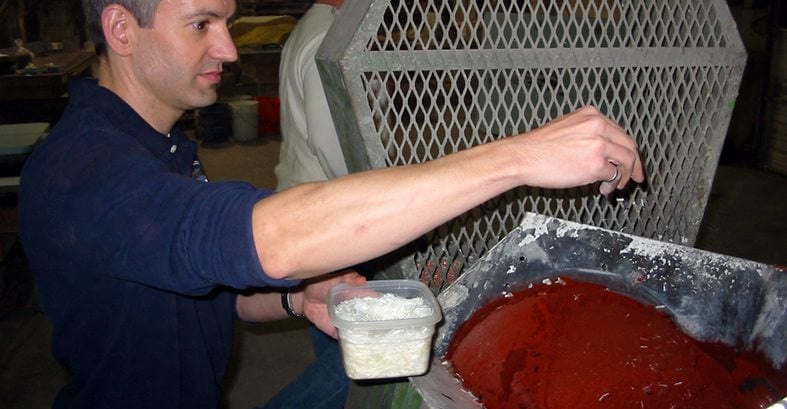
Jeff Girard adding synthetic fibers to the mix. Concrete Countertop Institute in Raleigh, NC
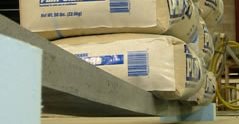
A classic illustration of what can be done with proper reinforcing. Concrete Countertop Institute in Raleigh, NC
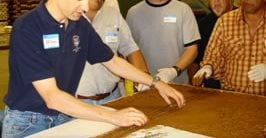
Placing ladder wire. Concrete Countertop Institute in Raleigh, NC
Fiber reinforcement
For additional insurance against cracking, some countertop fabricators add tiny synthetic fibers to the countertop mix. These fibers, alone, will not provide structural reinforcement for concrete countertops, but they are effective at controlling shrinkage cracking. Contractors usually use them in combination with steel rebar or wire mesh. Typically synthetic fibers are composed of polypropylene and nylon.
There are also fiber mesh options that come in rolls that can be cut to size. Sometimes this is referred to as scrim.
Another alternative is to use alkali-resistant (AR) glass fibers, which are higher in tensile strength than synthetic materials. Generally fibers won't affect the appearance of the finished countertop if they are added at the proper dosage and thoroughly mixed into the concrete.
No matter what reinforcing method you use, be aware that hairline cracks may still occur. However, they are usually nonstructural in nature and won’t detract from the appearance or performance of the countertop (see Do Concrete Countertops Crack?).
 White Countertop Mix
Pre-blended, all in one, high strength castable concrete mix.
White Countertop Mix
Pre-blended, all in one, high strength castable concrete mix.
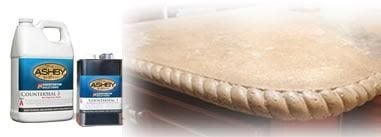 Topcoat Sealer
Produces a scratch and stain resistant top coating.
Topcoat Sealer
Produces a scratch and stain resistant top coating.
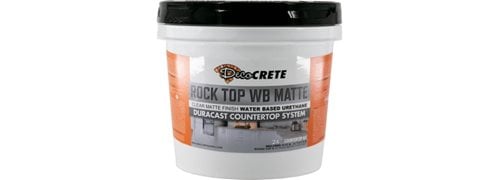 Rock Top Sealer
Clear matte finish, water-based urethane
Rock Top Sealer
Clear matte finish, water-based urethane
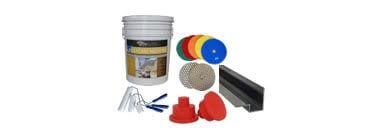 Countertop Products
All the supplies needed for great countertops.
Countertop Products
All the supplies needed for great countertops.
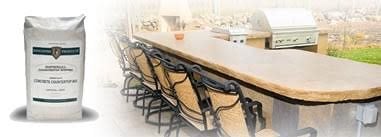 Imperial Countertop Mix
Engineered to be lightweight and strong. Minimal shrinkage.
Imperial Countertop Mix
Engineered to be lightweight and strong. Minimal shrinkage.





